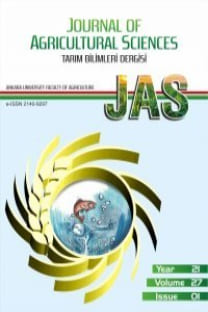BITKI YETIŞTIRME ORTAMI OLARAK PEATİN BAZI KİMYASAL ÖZELLIKLERI ÜZERINE KÜKÜRT İLAVESİ VE İNKÜBASYON SÜRESININ ETKİSİ
Peat, inkübasyon, Kükürt, pH, Bitki Yeti ştirme Ortamı .
THE EFFECTS OF SULPHUR ADDITION AND INCUBATION PERIOD ON SOME CHEMICAL PROPERTIES OF PEAT AS PLANT GROWTH MEDIUM
Peat, Incubation, Sulphur, pH, Plant Growth Medium,
___
- Andriesse, J. P. 1988. Nature and Management of Tropical Peat Soils. FAO Soils Bulletin No. 59, 165.
- Anonymous, 1975. Peat in Horticulture, New York, Academic Press, 170.
- Bremner, S. M. 1982. Total nitrogen, Methods of Soil Analysis. Part 2, Madison, WI, ASA-SSA, 595- 624.
- Çaycı , G.1989. Ülkemizdeki Peat Materyallerinin Bitki Yetiş tirme Ortamı Olarak Özelliklerinin Tesbiti Üzerine Bir Ara ştı rma, Doktora tezi (Bas ı lmamış)
- Çağlar, K. Ö. 1958. Toprak İlmi. Ankara, Ank. Üniv. Zir. Fak., 241.
- De Boodt, M., O. Verdonck, and I. Cappaert. 1973. Method for release curve organic substrates, Proceeding Symposium Artificial Media in Horticulture. 2054-2062.
- DIN 11542. 1978. Torf filr Gartenbau und Landwirtshaft.
- Fitzpatrick, E. A. 1971. Pedology. A Systematic Approach to Soil Science, Edinburgh, Oliver and Boyd, 306.
- Hanzen, H. H. and J. R. Bettany. 1987. The effect of temperature and water potential on sulfur oxidation in soils. Soil Sci., 144 (2): 81-89.
- Jackson, M. L. 1962. Soil Chemical Analysis, New Jersey, Prentice Hall Inc., 183.
- Kirven, D. M. 1986. An industry viewpoint: Horticultural testing-is your language confusing, Proc. of the Sym. Interpretation of extraction and nutrient determination procedures for organic potting substrates, 215- 217.
- Levesque, M. P. and S. P. Mathur. 1986. Soil tests for copper, iron, manganase and zinc in Histosols: 1. The influence of soil properties, iron, manganase and zinc on the level and distribution of copper, Soil Sci., 142 (3): 153- 163.
- Lucas, R E., P. E. Rieke, U. C. Shickluna and A. Cole. 1975. Lime and fertilizer requirements for peats, In: Peat in Horticulture, New York, Academic Press, 51-71.
- Richards, L. A. 1949. Mcthods of measuring soil moisture tension. Soil Sci., 68: 95-112.
- Puustjarvi, V. 1980. Rationalized micronutrient fertilization. Peat- Plant Yearbook, 3-12.
- U. S. Salinity Lab. Staff. 1954. Diagnosis and Improvement of Sahne and Alkali Soils.
- USDA Agricultural Handbook No. 60, Washington, D. C., 160.
- Yayın Aralığı: Yılda 4 Sayı
- Yayıncı: Halit APAYDIN
GÖKÇEADA SULAMASININ İZLEME VE DEĞERLENDİRİLMESİ
Ali İNAL, M .rüştü KARAMAN, Dilara ERDEN
TRİFLURALİN'İN TOPRAKTA NİTRİFİKASYON VE KATALAZ AKTİVİTESİNE ETKİLERİ
Sevinç ARCAK, Satea M. OMAR, Koray HAKTANIR
AZOTL U GÜBRELEMEN İN ŞEKER PANCARINDA N İTRAT B İRİKİMİ VE ÜRÜN ÜZERINE ETK İSİ
ÇAY ATIKLARININ BİTKİ YETİŞTİRME ORTAMI OLARAK KULLANILABİLME OLANAKLARI
A. Cihat KÜTÜK, Gökhan ÇAYCI, Abdullah BARAN
CİVCİV KÖRBARSAĞINDAN IZOLE EDİLEN BAZI LAKTOBASİL SUŞLARININ ÇEŞITLI ANTİBİYOTİKLERE DİRENÇLERİ
Aynur Gül KARAHAN, M. Lütfü ÇAKMAKÇI
Gökhan ÇAYCI, Ali İNAL, Abdullah BARAN, Sevinç ARCAK
FARKLI AMBALAJ MATERYALLERINİN BİBERİN Capsicum annum L. var. longum SOĞUKTA MUHAFAZASINA ETKİSİ
Nilgün HALLORAN, Ruhsar YANMAZ, M.ufuk KASIM, Rezzan ÇAĞIRAN
